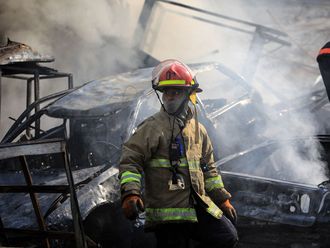Baghdad/Arbil: As Iraqi forces prepare to try to recapture the city of Falluja, tens of thousands of civilians find themselves trapped between Daesh militants ready to use them as human shields and a government suspicious of their loyalties.
With the militants coercing them to stay, and a government blockade and shelling closing exit routes and cutting off supplies, there is “a vice, a noose around the neck of the population”, Lise Grande, the UN humanitarian coordinator in Iraq, said.
Iraq’s government on Monday announced the start of operations to “liberate Al Anbar”, the province west of Baghdad whose cities and towns along the Euphrates have since last year become strongholds of Daesh.
“Since military operations began, it has become impossible to leave,” said one 42-year-old teacher.
“They [Daesh] have planted bombs at the entrance and exits to the city and on the main roads to prevent security forces entering or citizens leaving.” Communication with those still inside Falluja is increasingly difficult.
The teacher was afraid to let his name be used, and his comments were relayed by a friend.
Baghdad’s last military push against Daesh, to retake Tikrit in April, came after most citizens had fled.
Leaders of the Iran-backed militias fighting alongside Iraq’s army say Falluja’s civilians will be evacuated before the final push, but, in a climate of fear, residents are not confident.
This week, hundreds of fighters who said they had come from Syria and the northern Iraqi city of Mosul paraded through Falluja, said the teacher, whose account of Daesh’s tight control was echoed by other sources. Preachers in mosques were warning people not to cooperate with security forces and, after prayers, Islamists were delivering “jihadist lectures”.
Hisham Al Hashemi, an Iraqi security analyst, said Daesh had this week confiscated the identity papers of up to 50,000 people to stop them leaving, and that it was extremely difficult to escape either Falluja, seized by Daesh early last year, or nearby Ramadi.
The teacher said the Islamists, who have declared a caliphate in Iraq and Syria, were in effect holding the population hostage to “attract the sympathy of militants worldwide” when the government assault came.
A 49-year-old taxi driver inside the city said fruit, meat and vegetables were becoming harder to find since roads into the city were blocked. Umm Asma, a housewife, said she was rationing food to her family in case there was a long siege.
Some people are still managing to make perilous escapes from Falluja, however; Reuters spoke to four families who said they had left this week.
Ahmad Abdul Rahman, a 48-year-old taxi driver, said he had run the gauntlet of heavy bombardment when he found an exit north of the city to bring out his wife and two children three days earlier.
“We still can’t believe that we have left Falluja,” he said.
“We have left everything behind: the car, the house and the furniture.”
The outskirts of Falluja are at least spared air strikes by a US-led coalition, because the government forces advancing on the city are mostly Iranian-backed “Hashid Shaabi” militias, which Washington is reluctant to support.
There is, however, air support for the Iraqi army forces advancing on the provincial capital Ramadi, halfway between Falluja and Baghdad, from where thousands fled in April and May as Daesh seized the city.
There are no precise figures for the remaining populations in either city. Hashemi said Falluja still had around half its pre-crisis population of 370,000. Other estimates suggest far fewer remain.
But even those who safely make it out of Iraq’s Sunni heartland, where Daesh has in part been able to tap into long-standing resentment of the Shi’ite-led authorities in Baghdad, complain that they are met with suspicion in the capital.
“All roads were closed off, as if we are enemies of the government,” said Saad Jaber, a 41-year-old who said he had been forced to stay with his brother in a town south of Falluja because he could not get to Baghdad.
“The government was supposed to reward us and help us because we managed to escape from Daesh,” he said. “It’s not our fault that the government is weak and unable to defend us.” Authorities in Baghdad, which has suffered repeated waves of car bombings claimed by Daesh, are wary of admitting a flood of displaced Sunni civilians, fearing that militants could slip in with them.
That led to many thousands of people being blocked at a bridge across the Euphrates in intense heat earlier this summer.
While much of the focus has been on the two main Al Anbar cities closest to the capital, towns farther up the Euphrates valley nearer to Syria are ever more isolated and finding it harder to get food, Grande said.
Haditha, one of the few government-held towns in Al Anbar, is increasingly cut off by Daesh fighters. “We have reports that food prices are increasing to the point where families can’t afford basic commodities,” UN coordinator Grande said.
But just as the United Nations prepares for “what is likely to be a very difficult summer” of humanitarian crisis across Al Anbar, she said it was running desperately short of money.
“Seventy-seven front-line health clinics are closing or dramatically scaling back,” she said.
Even if security forces are successful in Ramadi and Falluja, they will face further battles — and run into millions more civilians — on the way to recapturing their ultimate northern target, Mosul, Iraq’s second city.
“Many towns will be impacted,” Grande said. Already the situation is desperate, and it is getting much, much, much worse.”
— Reuters












